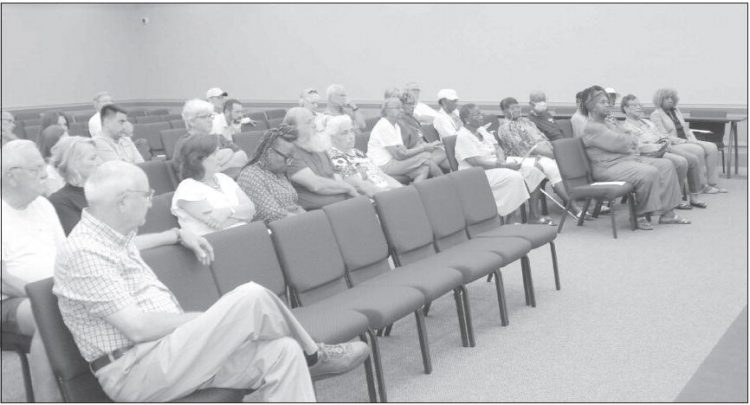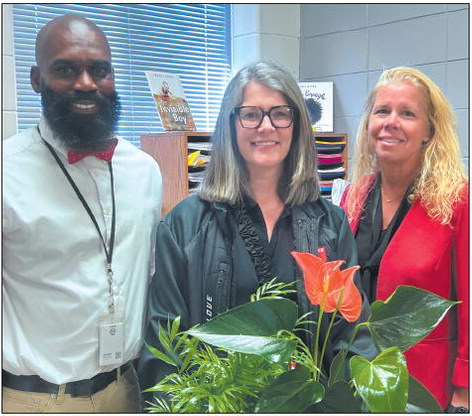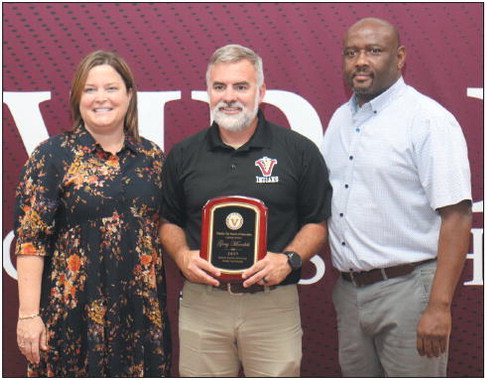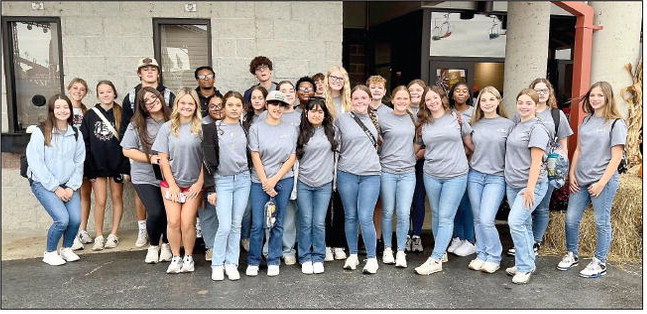continued from page homeless shelter ….


continued from page
homeless shelter or to provide services for the homeless without obtaining a conditional use permit.
To obtain this permit, applicants would have to have an operational tax license. When reviewing applications, authorities would review the character of the applicant, appropriate security plans (for shelters only), impact on the area surrounding the service site, whether the applicant contacted the appropriate neighborhood housing association, and more.
These licenses would only be valid for 10 consecutive days and would be re-obtained; an 83-day grace period would be allowed. Also, the City Manager would reserve the right to revoke the permit if there were an event that threatens the safety, health, or welfare of the community. If this occurred, the City Manager could shut the facility down for three days, during which time it would be decided when and if the facility may reopen.
Upon the announcement of this proposition, the public began to speak out, sharing concerns about the costs of the permits and other provisions which the potential law designates. This concern prompted City Manager Josh Beck to address the public, saying that he wants to assure the public that the Council understands the importance of helping the less fortunate, but needs to set guidelines to ensure the safety of the public.
At the Council meeting on July 8, Beck announced that rather than voting on a second reading of this ordinance, the Council would be holding public hearings to allow citizens to share input on the laws which will govern them. “During my Monday morning meetings with department heads, I usually share this quote from John Wesley – ‘We all should have unity in the essentials, grace in the nonessentials, and love through it all.’ We all want the same thing – to make Vidalia better,” he emphasized.
During the public hearing on August 13, Beck shared a similar message prior to opening the floor to public comments. “The whole purpose of this is to encourage public participation,” he told the attendees. “If you remember, the way that we were going to do the ordinances, there was a lot of valuable input shared. We believe that you should have your voices heard before we all live under the laws that we are going to pass, so it’s critical that we have public participation as much as we possibly can.”
During the hearing, City Attorney Daniel O’Connor explained to the public several changes that had already been made to the ordinance draft, such as: An added clause ex cluding “incidental provision of a product or service to a homeless individual by a licensed business or nonprofit organization, when said business or nonprofit organization is regularly engaged in providing the same product or service to the public outside of the homeless population” from needing a conditional use permit e exclusion of substance abuse centers or housing provided by a domestic violence shelter which is qualified as an IRC 301(c)(3) organization from needing a conditional use permit to house the homeless e extension of the conditional use permit from 10 days to 60 days e designation of homeless shelters to remain in areas zoned C-3 A clause stating that after hours loitering, camping, sleeping, etc. at the homeless day shelter or surrounding streets and sidewalks must follow the existing Urban Camping Ordinance “I made a few adjustments based on some of the things that were being discussed at that time. Keep in mind, this doesn’t have to be the final form of the ordinance; so, it would help myself and the Council if you would be specific about the circumstance or wording of the ordinance with which you are concerned,” O’Connor commented.
Upon opening up public comment, 15 citizens stepped up to share their voices regarding the subject.
Some individuals, such as Dent Temples, spoke of the destruction and issues with which landlords and businesses had dealt regarding the homeless. He stated that it is imperative that something be done to help avoid these issues.
“We’ve experienced something here that we have not seen at other shopping centers such as Sylvania, Statesboro, Claxton, Fitzgerald, Cairo, and Swainsboro to this extent, and that is a large increase in the amount of homeless people,” Temples said. “A lot of these people are good people; they are homeless because they couldn’t help it. Some are homeless by desire, and some are hiding from the police. We’ve already found one of those, thanks to the Vidalia Police Department; but what it has done is cost a lot of landowners and business owners a lot of money [in repair and clean-up].”
For example, he informed the Council that four retailers in the area have lost a combined total of over $47,900 of shopping carts – specifically, 251 shopping carts – and that landowners had spent over $30,000 to clean up areas of debris left by the homeless population. “It’s costing people of Vidalia. Another issue is – and it’s not all related to the homeless population – the shoplifting has increased significantly. I applaud you for taking this stance. We have people in this community that need help and that we don’t need to turn our back on; but we do need to assist people so that they don’t spend this kind of money,” he concluded.
Other individuals, such as Pastor Ronald Miller, told the Council that they were concerned that the shortage of police officers in Vidalia would also cause complications in the ordinance. “One of my only concerns is continuation. We can put the ordinance in place, but we also have to have strong police enforcement. We may not have enough police in Vidalia for this. That being said, I am pleading to this Council and to the rest of you to please look into that to make sure it is as effective as it is read,” Miller remarked.
Several local pastors also stepped up to ask how the ordinance would change their current ministry outreach programs of providing food and supplies to those without homes, and one citizen asked for resources for how people may donate money to help the homeless.
Ricky Mitchell spoke of the challenges faced by Cornerstone Church, stating that their children’s center often had homeless individuals sleeping under the property’s pavilions. “We need to enforce things. If there is anything we can do to support the homeless, we are here both financially and physically. I have businesses in Lyons and Vidalia; we don’t have this issue in Lyons. This is a Vidalia problem,” he told the council.
Vidalia Recreation Department Director Scott Strickland spoke to the Council about issues with which the Department – specifically at the Ed Smith Complex – had dealt regarding the homeless. He explained that carts had been left on the property, drugs had been found on the premises, and many citizens had called the Department’s office because they were afraid to exit their cars because of homeless individuals loitering in the area.
“This journey started for us around 19 months ago; we had them out there for a temporary shelter, and from that day forward, we’ve dealt with an everyday battle,” Strickland said. “We have witnessed a decline in the elderly population utilizing our park due to the presence or potential presence of the homeless. The elderly have always used our park for walking on the trail for sunshine and exercise. Unfortunately, that has been dampened by fear and concern for safety.”
Strickland emphasized his frustration with the presence of Narcan in the Dixon Building when the building was being used as a temporary warming shelter, and of the drugs which had been found by Boy Scouts at the park. “I believe that what you tolerate, you promote. If we tolerate that where the kids are playing, we promote it – that’s a problem,” he commented. “We cannot safely and effectively cherry pick those who actually need help and those who are unfortunately up to no good.”
Fellow citizen Junior Elkhatib responded to these remarks, stating that he had stayed at the shelter with the individuals for caretaking and security purposes, and could address several of the concerns. Elkhatib explained that the Narcan had been brought as a basic procedure from Forge Men’s Recovery Center, “not because the homeless were expected to overdose, but just in case of the situation.”
He stated that he felt that the comments that had been shared throughout the night were not wrong, but felt that the “bigger picture” had been lost by the generalization of the homeless. “What do we do whenever we have a problem? The answer that I have is profile. We all talked about homeless people – we talked about trash that is being left? Homeless people. Property being destroyed? Homeless people. Police department not doing enough? Homeless People. We generalized homelessness. That’s like saying that the City of Vidalia is just not doing its job – that’s generalizing that whole issue. Not all homeless people are destructive,” Elkhatib said. He continued, “For instance, my son was nine years old the first time he told me that he knew of drugs being sold at his school. Do you not think that some of those drugs that were found could have been by some of those younger kids selling drugs? They could have. Could they have been by the homeless? Absolutely.”
Elkhatib emphasized, “They are the easiest people to blame things on, but we have to remember that they are people. There are great people that are less fortunate and there are horrible people that are less fortunate. There’s great people in our government; there’s horrible people in our government. We can’t point at someone and say, ‘It’s your fault.’” He told the Council that he did not agree with making the City a “sanctuary city” for the homeless, as he understood the negative repercussions of this designation, but would love to see a transitional center created to help those struggling with homelessness to get back on their feet. He also suggested that rather than jailing those who violate the shopping cart ordinance, leaders should have violators complete community service to better the community.
”We have to get them accountability for their actions if they do something wrong. We can’t let them become animals if that’s the way they are heading, but at the same time, we can’t act like animals toward them. We can’t punish them all because they’re less fortunate; it’s growing because of the economy. We are all one paycheck away from being them, so we need to be careful because we don’t want to have a target on our back for being less fortunate,” he shared. “I want us to do things with open eyes, ears, and hearts, and help our City to do better.”
Max Tapia and Ed Daniell also spoke in support of helping those struggling with homelessness, as they explained that they had been close to dealing with the issue themselves.
“I was on the brink of being homeless, and I was able to get out. I was very fortunate, but it took some help from people that were out there who were willing to help,” Tapia emphasized. “If you want to be a good person and feed someone else, I think you should be able to do it – especially if it is out of your own money.”
Tapia also commented on the statements that had been made about drugs, stating, “It is not a homeless problem – everyone uses drugs from the higher ups to the very bottom. It’s not just the homeless that have issues with drugs. It’s not just the homeless that have issues with vandalizing things. There’s good and bad in everyone.”
Others agreed that creating a transitional center – which would house the homeless for 18 to 24 months – would be excellent for dealing with the growing issue. William Bell even offered to speak with the Council about placing a facility within property which he recently bought in Vidalia.
Beck closed the hearing by emphasizing that the City would review these comments made by the public and would amend the ordinance further as they saw fit before voting on the ordinance on September 9. He encouraged those who had comments but did not wish to share them in the public forum to email them to him at jbeck@vidaliaga.gov.





